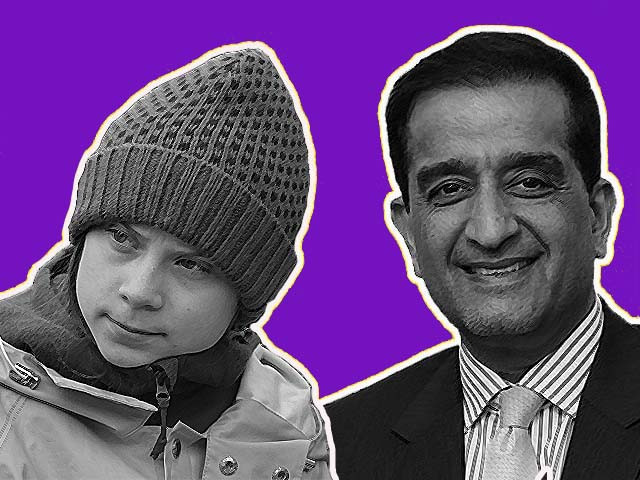
COP26: Global greenwash or progress to keep 1.5C goal alive?
It’s been an exhausting 26th UN Climate Change Conference of the Parties (COP26) so far. Is it all the testing and the prior difficult travel to the COP caused by the COVID pandemic (numbers are still quite high in the UK) or is it all the poor organization and long queues to get into the Scottish Exhibition Center, the venue for the COP in Glasgow? Probably a bit of both – the World Leaders Summit that kicked off COP26 added more chaos as dozens of heads of state including the US President arrived in Glasgow leading to roads being blocked and people being refused entry, leading to accusations that this COP is the most exclusionary in the history of COPs.
The Presidents of China and Russia, however, did not show up which is disappointing as so much hype was created in the run up to the COP as a “global summit”. Pakistan’s PM also cancelled his visit in the last week due to domestic concerns. The ten person strong official Pakistani delegation to the COP is now being led by Malik Amin Aslam, the Special Assistant to the PM on Climate Change (with party delegates from both the Ministry of Foreign Affairs and Ministry of Climate Change).
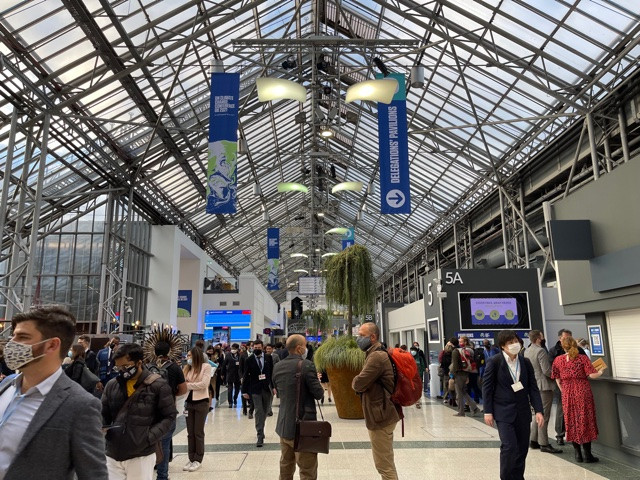
Poor organisation and long lines led to complaints in the first week of COP26.
It has also been raining heavily in Glasgow, although by the time I arrived the sun had come out. The Pakistan Pavilion at COP26 has been bustling with activity, with lots of side events on the many climate friendly initiatives taken by Pakistan. “We have a clear climate direction now”, explained SAPM Amin Aslam. “By 2030 we aim to shift to 60% renewable energy and 30% electric vehicles and completely ban imported coal. We are opting for nature based solutions with our Recharge Pakistan, Protected Areas Initiative and 10 Billion Tree Tsunami Programme. It’s a nature positive pathway”. All this has been reflected in Pakistan’s recently updated Nationally Determined Contributions pledge (which all countries have submitted in preparation for the COP).

SAPM Malik Amin Aslam with ADB pfficials at the busy Pakistan Pavilion at COP26.
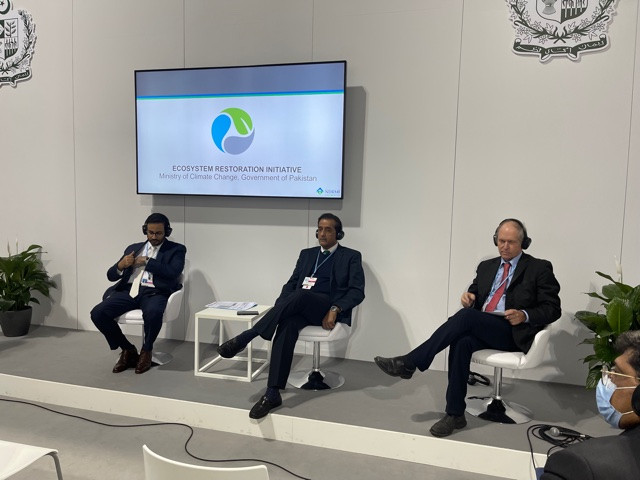
Pakistan's ecoystem restoration initiative lauded at COP26.
Now that the world leaders have left and the climate negotiations are seriously underway, the conference halls seem quieter. The energy inside is still low but out on the streets of Glasgow the youth are full of energy and fury. “Just look at their track record. They’ve had 26 COPs and decades of blah blah blah and where has that led us? Over 50 percent of all our CO2 (emissions) have grown since 1990 and about a third since 2005. All this while the media is reporting what those in power say they are going to do rather than what they actually do. Time and time again the media fails to hold the people in power responsible for their action and inaction” raged teen activist and original climate striker Greta Thunberg during this Friday’s climate strike in central Glasgow. She termed COP26 a “global greenwash festival”.
Greta chided world leaders for refusing to do the bare minimum like providing loss and damage to the least responsible countries (for climate change) while opening up new coal power plants etc. She is right as so far rich countries have not even reached the $100 billion target they promised to developing countries to tackle climate change impacts. In fact they are resisting a standing agenda item on setting a new collective goal to replace the $100 billion a year (that was to be given to poor countries in green climate finance). They also don’t want to talk about any financing for loss and damage as a pillar of the Paris Agreement and are deliberately unclear about the Global Goal on Adaptation.
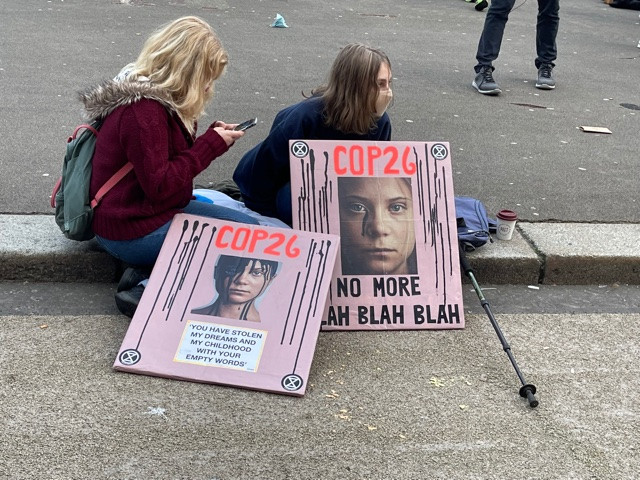
Young people inspired by youth leader Greta Thurnberg.
She led thousands of people through the streets of Glasgow this weekend. Young and old participated in the “street party” with people holding up placards like “COP26: We are watching you” and “Don’t burn our future” and the now famous “blah, blah, blah!”. The march through Glasgow ended in the central St George Square where a small stage had been set up for the climate strikers. Before Greta’s speech a number of activists from climate impacted countries like Uganda, Colombia, Brazil and Afghanistan spoke about how climate justice is social justice and how the youth deserved a greener future.
A young Pakistani activist, Ayisha Siddiqa, who co-founded Polluters Out, a group dedicated to removing fossil fuel industry presence from climate negotiations, also spoke on the stage as an invited speaker. Ayisha, who now lives in the US, spoke about climate impacts on her family growing up in Pakistan where even the drinking water is polluted in many places. In Ayisha’s views, the COP wouldn’t be where it’s at without pressure from civil society. “The only group that is treating the climate crisis like an emergency is the youth”.
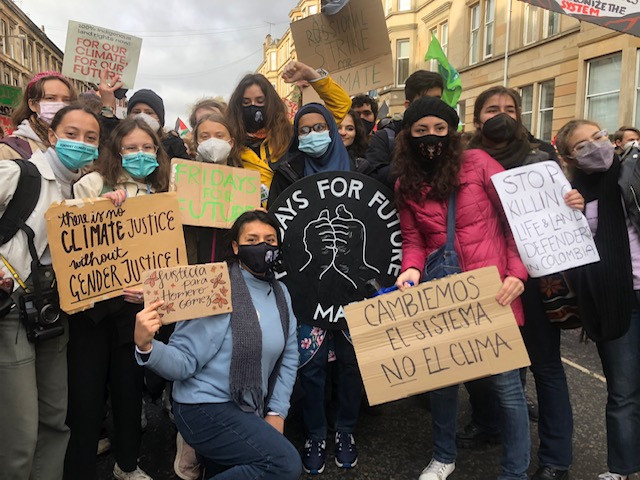
Greta Thurnberg at Firday's climate strike with other youth activists in Glasgow.
Many experts agree that while there is no alternative to the long, drawn out UN climate negotiations (which is a consensual process), these strikes and protests can certainly focus the negotiators minds by sending a signal that the whole world is demanding real and urgent climate action, not just empty targets with no plans to meet them. These well attended marches (more are planned next week) also put pressure on political leaders to do more.
So far the only good news coming out of COP26 is that the commitments and initiatives seen in the first week of the conference (if fully delivered by nations) would amount to 40% of the emissions cuts needed by 2030 to keep the world on track to a maximum of 1.5C of global warming. That is the conclusion of an initial analysis by the Energy Transition Commission (ETC).
To keep the goal of 1.5C alive, the ETC said annual global carbon dioxide emissions must halve by 2030, a cut of about 22bn tonnes. It calculates that new national commitments to reducing emissions (updated NDCs) could cut 3bn tonnes from that, and that the agreement by many countries to stop deforestation by 2030 cuts another 3.5bn tonnes. A further 2.5bn tonnes is cut by initiatives from countries and companies to move away from coal power and invest more in renewable energy and electric vehicles. The ETC said more announcements were expected in the second week of COP26. There has also been a big pledge on methane, a powerful greenhouse gas. Pakistan, which is amongst the word’s top 30 methane emitters, has also joined more than 80 nations who signed up for the US led global methane pledge agreeing to cut methane emissions by 30% by the end of this decade.
Lord Adair Turner, the chair of the ETC, said “good progress” had been seen in the first week of COP26: “But of course it is still not enough and even with further progress next week – on steel, aviation, shipping – we are not going to achieve the full 22bn tonnes we need; we’re not going to be able to go home from Glasgow saying job done. But we have new commitments which will make a difference and which must be delivered, and we have a springboard for further progress which we must achieve over the next few years,” he said. “We can achieve that and we must achieve that.”
All photos courtesy of Rina Saeed Khan.

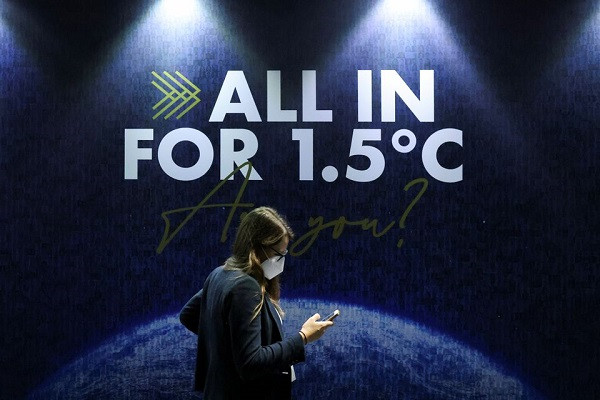
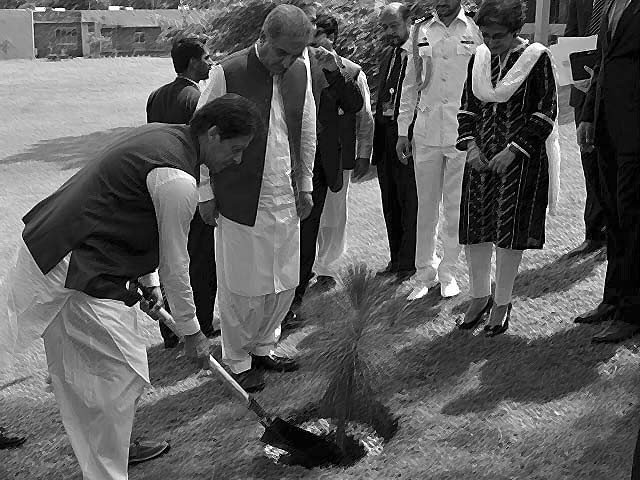
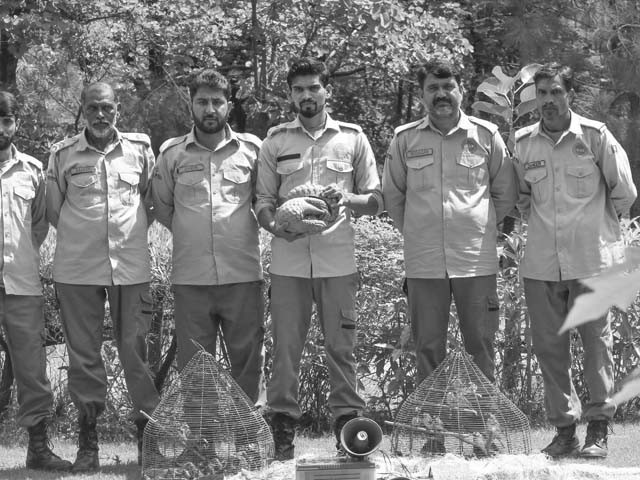
COMMENTS
Comments are moderated and generally will be posted if they are on-topic and not abusive.
For more information, please see our Comments FAQ